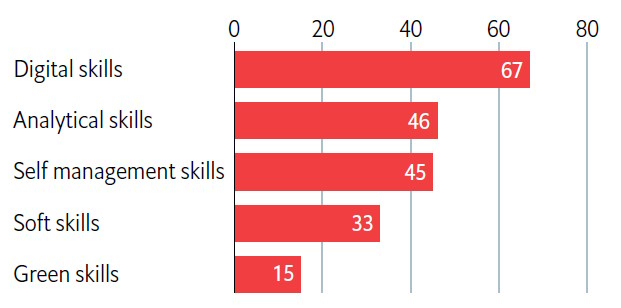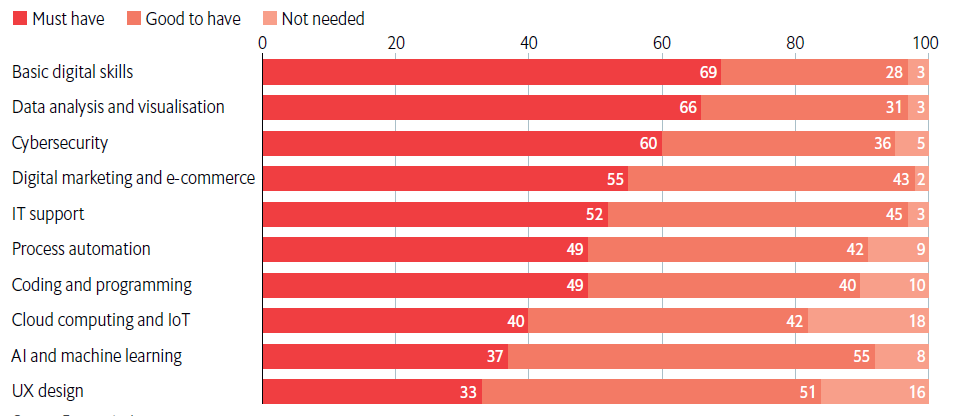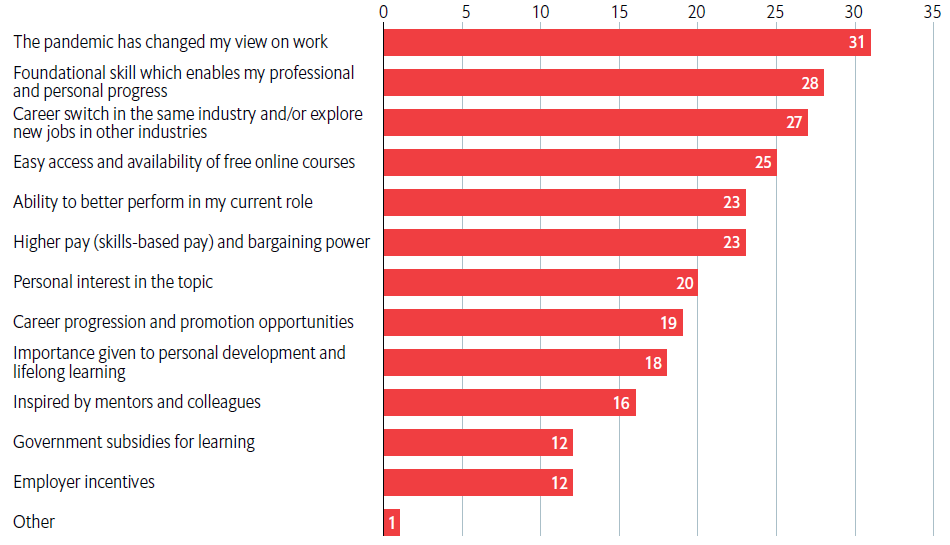Bridging the skills gap: fuelling careers and the economy in India
Economist Impact, supported by Google, conducted a survey of 1,375 employees across Asia-Pacific (APAC), including 100 employees from India, between November 2022 and January 2023. It also interviewed employers and industry experts across the region to understand their perspectives on skills gaps, as well as reskilling and upskilling aspirations.
The survey respondents were drawn from across 14 markets in the region, out of which 11.8% were Gen Z (born in 1997-2012), 63.2% were Millennials (1981-96) and 25% were Gen X (1965-80). They all work in a diverse mix of industries.
The research shows that across the region there is a mismatch in the supply and demand of skills between employers and employees. Understanding these gaps will be instrumental in creating a workforce that is prepared for the economy of the future.
This article—one in a series of 14 market reports—examines these issues in India. This series complements a research paper that looks at the reskilling and upskilling imperative across APAC.
Key findings:
- Digital skills are considered the most important to acquire by 67% of employees in India, more than in any other country in APAC, barring Singapore.
- Advanced digital skills are in high demand as Indian businesses move up the technology ladder. Two-thirds (66%) of employees in India consider data analysis and visualisation and 60% consider cybersecurity skills as “must-haves”.
- Two-thirds (66%) of employees look to their employers to help them acquire new digital skills.
Despite emerging competition from Eastern Europe and elsewhere in APAC, India remains prominent in outsourcing digital capabilities such as IT skills, largely due to its cost-advantage and high digital skills competencies. “Digital skills are not only important, but have become a differentiator for India,” says Ved Mani Tiwari, chief executive officer at the National Skill Development Corporation (NSDC). He explains that the rapid expansion and adoption of mobile internet access, as well as a growing start-up ecosystem, have given rise to a “gig economy”, which requires more digitally skilled workers.
The pandemic forced firms of all sizes to rapidly advance their digital transformations to overcome disruptions to their operations. Krishna Raghavan, chief people officer at Flipkart in India, notes that the upskilling imperative was also accelerated by the sudden influx of venture capital into local start-ups, as investors looked beyond China for opportunities to spread their risk and find opportunity.1 As a result, start-ups scrambled for more tech talent, a surge that has both exacerbated existing skills gaps and provided more motivation for Indian employees to upskill.
Demand mounts for digital skills
According to our survey, digital skills ranked as the most important category for employees, picked by 67%. Meanwhile, 46% consider analytical skills the most important, followed by self-management skills, which was picked by 45%.
Figure 1: Snapshot of skills considered important by employees in India
Which skill categories do you think are the most important for the workforce in your sector to acquire today? (% of respondents)

Source: Economist Impact, 2023
A closer look at the data provides a more nuanced picture of India’s skills needs. Basic digital skills, such as operating software like Microsoft Office and setting up digital communication tools, are considered the most important in our survey. Moreover, as advanced digital skills gain importance, the demand for these capabilities is surpassing the current capabilities of the workforce—illustrated by the finding that nine out of ten companies in India report hiring issues due to the rising technology skills gap.2
Our survey findings reinforce the surging demand for workers with advanced digital skills. Data analysis and visualisation (65.7%), cybersecurity (59.7%), coding and programming (49.3%), cloud computing and the Internet of Things (IoT) (40.3%), and artificial intelligence (AI) and machine learning (37.3%) are considered by many in the workforce as “must-have” skills as Indian businesses ramp-up their uptake of technology.
Figure 2: High demand for advanced digital skills
Indicate which specific types of digital skills are must-have, good to have or not needed for the workforce in your sector today. (% of respondents)

Source: Economist Impact, 2023
Mr Raghavan says that data science has seen particularly surging demand due to the “increased use of intelligence in products and services that companies want to build”. The surge in AI applications is projected to add US$500bn to the country’s GDP by 2025.3 Cybersecurity will also remain a core priority for India as the country digitalises rapidly.4 Growing digitalisation, coupled with rapidly growing access to mobile internet, has increased exposure points and therefore vulnerability to bad actors.5
Apart from digital skills, soft skills such as time management, resilience, stress tolerance and active learning ability are becoming increasingly relevant in the workplace. Mr Tiwari stresses the value of soft skills in all roles, as “not everyone can be a software engineer, but every worker must-have good time management skills, resilience, stress tolerance and active learning ability if they are to adapt to an ever-changing landscape.” The rise of remote work has highlighted the importance of soft skills, particularly for managers, says Mr Raghavan. Almost three in four (72.7%) respondents consider leadership skills among the most important soft skills. Additionally, 35% of employees believe that analytical skills like problem solving and critical thinking are crucial to performing better in their current job role.
Government and employers play key roles in supporting upskilling
Employees in our survey report wanting to upskill and reskill to markedly improve their current and future career prospects. For seven out of ten (70%) employees, upskilling has had a high to very high impact on improving their current job performance. Meanwhile, for 72% of Indian employees, upskilling and reskilling have had a high to very high impact on helping to find more meaningful careers. Moreover, a quarter (28%) view retraining as “foundational” to enabling their professional and personal progress.
Despite these benefits, 33% of employees report that the most significant obstacle to upskilling is a lack of time due to long working hours or other commitments. Many employees face long commuting hours, leaving them with little or no time to undertake training courses beyond what their role requires. Meanwhile, 28% cite the high cost of courses.
Figure 3: Various factors drive digital reskilling in India
What best describes your motivation to acquire new digital skills? (% of respondents)

Source: Economist Impact, 2023
Employers have a direct hand in addressing these challenges as they determine what skills are in-demand, and how and where employees can access reskilling opportunities. For instance, two in three (66%) employees in India report that they acquire digital skills through workplace training—yet 23.5% say their workplaces don’t foster a learning environment. Companies could explore more ways to integrate upskilling within their culture, whether by enabling more online learning or reallocating workloads to free up time. Positively, there is growing acceptance of alternative options for retraining—71% of employees say their employers value online certificates and believe they reflect the skills acquired accurately.
Beyond the workplace, the government’s role is pivotal to lifelong learning. Almost half (48%) of employees in our survey rely on government awareness programmes for information about which skills will be valuable in the future. Recent years have witnessed government efforts to spur knowledge. Launched in 2015, Skill India Mission was created to implement training programmes for 400m people by 2022, bridging the gap between industry demands and skill requirements. The skills range from apprenticeship training to online skilling. To realise this mission, the government allocated funds worth US$379.1m to the Ministry of Skill Development and Entrepreneurship in its 2021-22 budget.6
Employees acknowledge the government’s role across various upskilling or reskilling areas. Nearly four in ten (37%) consider the government important in providing financial incentives for skilling. The government could also play a crucial part in identifying and addressing the skilling needs for different target groups. This is highlighted by 35% of the surveyed employees who recognise the government's role in providing access to diversified skilling programmes.
As India continues its digitalisation journey, advanced digital skills and soft skills are becoming increasingly important. Upskilling the market’s vast talent pool will help it retain its competitive edge globally, adapting to evolving skills demands. As employees struggle to find time to keep learning, employers could offer support that ensures that learning is an integral part of job roles. Incentives will also help. Financial incentives offered by the government will help to address the cost barriers that employers face to retain and train their talent.








